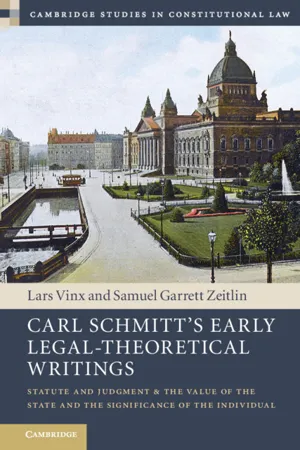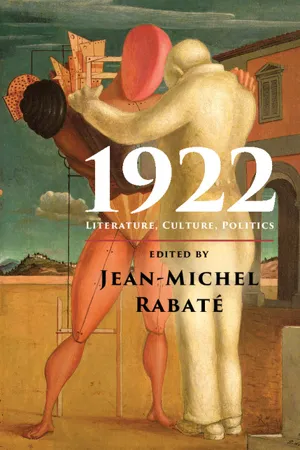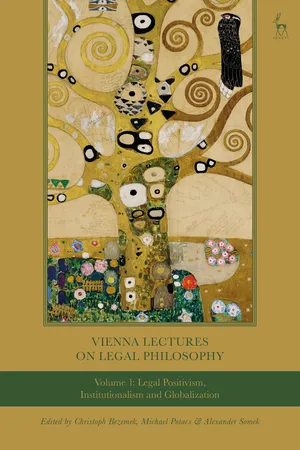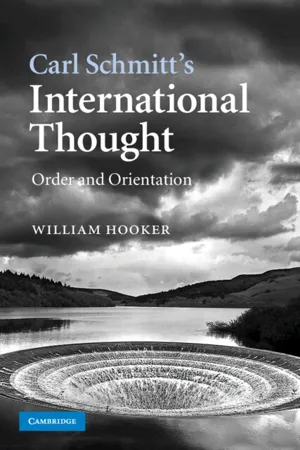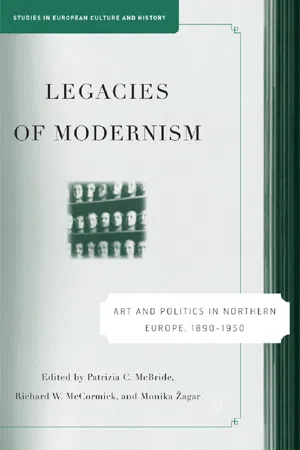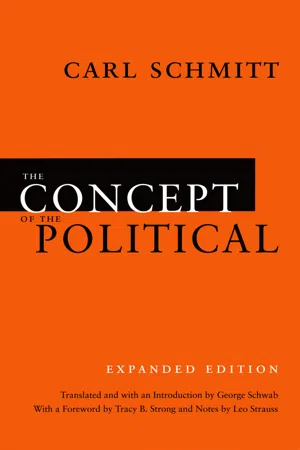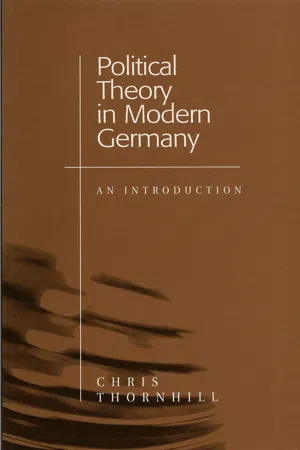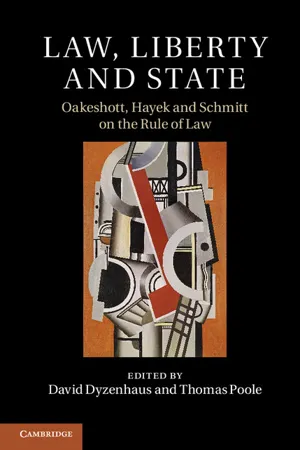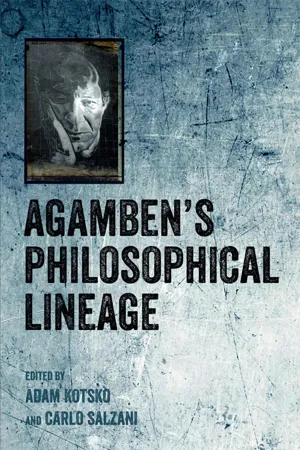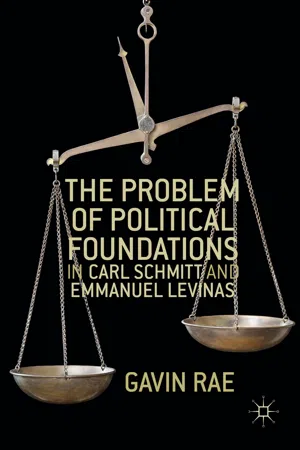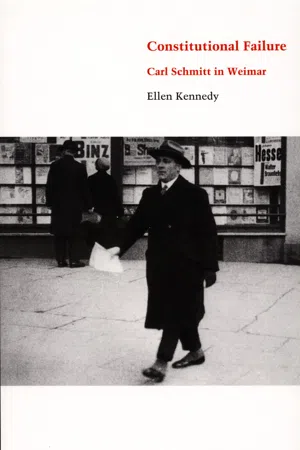Politics & International Relations
Carl Schmitt
Carl Schmitt was a German jurist and political theorist known for his influential works on political theory and international relations. He is particularly recognized for his concept of the "state of exception," which explores the suspension of legal norms in times of crisis. Schmitt's ideas have sparked significant debate and analysis in the fields of political philosophy and law.
Written by Perlego with AI-assistance
Related key terms
1 of 5
12 Key excerpts on "Carl Schmitt"
- eBook - PDF
Carl Schmitt's Early Legal-Theoretical Writings
Statute and Judgment and the Value of the State and the Significance of the Individual
- Lars Vinx, Samuel Garrett Zeitlin(Authors)
- 2021(Publication Date)
- Cambridge University Press(Publisher)
u Introduction Carl Schmitt and the Problem of the Realization of Law From Political Theory to Jurisprudence The famous pithy aphorisms that Carl Schmitt used to open his major works – ‘the sovereign is he who decides on the exception’, ‘the concept of the state presupposes the concept of the political’, etc. – have become a part of the common discourse of contemporary schol- arship on politics and the law. The theoretical framework that animates these slogans, however, has remained somewhat opaque. It has often been argued that there is no such framework – that Schmitt was a situational thinker whose works are best understood as inter- ventions in concrete political debates that do not add up to a grand theoretical vision. 1 This apparent lack of unity has encouraged a great variety of rather different appropriations. From the left, Schmitt is portrayed as a radical theorist of popular sovereignty, of constituent power and agonistic democracy who aimed to defend popular rule against liberal elitism. 2 Some commentators, by contrast, see Schmitt as a defender of a form of constitutional democracy, 3 even while others interpret him as the prophet of a politically authoritarian neoliberal capitalism. 4 It has been argued that Schmitt’s views form the template for populist authoritarianism and that his ideas were, from the beginning, congenial to Nazism. 5 Other scholars have categorized Schmitt as an opponent of 1 Löwith (1995). 2 Kalyvas (2008); Mouffe (1997); Balakrishnan (2000); Rasch (2016). 3 Schwab (1989); Bendersky (1983); Schupmann (2017). 4 Cristi (1998). 5 Scheuerman (2020); Dyzenhaus (1997), 38–101. 1 legal positivism who rightly objected to a reduction of political legitim- acy to mere positive legality. - eBook - PDF
1922
Literature, Culture, Politics
- Jean-Michel Rabaté(Author)
- 2015(Publication Date)
- Cambridge University Press(Publisher)
248 Chapter 16 Modernist Political Theologies: Carl Schmitt’s Political Theology (1922) and Walter Benjamin’s “Critique of Violence” (1921) Tracy McNulty In Political Theology: Four Chapters on the Concept of Sovereignty (1922), the German jurist Carl Schmitt famously declares that sovereignty, even in a constitutional government, ultimately resides with “he who decides on the exception” (1985, 5) determining when the constitution must be entirely suspended to address an extreme threat to the state that falls out- side the bounds of standard legal prescriptions. With this claim, Schmitt not only anticipates the permanent suspension of the constitution of Weimar Germany in 1933, but also articulates the legal rationale and ideo- logical foundation for the absolute dictatorship of Adolf Hitler (whom Schmitt would later hail as the epitome of the sovereign). The book’s title restores the former prominence of the political-theolog- ical paradigm of sovereignty that dominated European political life from the medieval period through the age of absolutism, before being eclipsed by the great political revolutions of the late eighteenth century. While broadly inspired by Catholic political philosophy, Schmitt’s understand- ing of political theology nonetheless differs in several important respects from its most recognizable manifestations: the medieval political concept of the “king’s two bodies,” which holds the monarch to be at once a mortal human being and the living embodiment of an immortal office (The King is dead; long live the King!), and the doctrine of the divine right of kings that defines the sovereign as God’s representative on earth. - eBook - PDF
Vienna Lectures on Legal Philosophy, Volume 1
Legal Positivism, Institutionalism and Globalisation
- Christoph Bezemek, Michael Potacs, Alexander Somek, Christoph Bezemek, Michael Potacs, Alexander Somek(Authors)
- 2018(Publication Date)
- Hart Publishing(Publisher)
3 Why Read Carl Schmitt? MARTIN LOUGHLIN I. Introduction It is difficult to think of a modern jurist who has generated as much controversy as the German public lawyer, Carl Schmitt. In a series of wide-ranging works spanning most of the twentieth century, Schmitt made a major scholarly contri-bution to jurisprudence and political theory, and also had a significant influence on the study of history, philosophy and literature. Notwithstanding the breadth of his range, the main theme of Schmitt’s work is surely his critical analysis of liberal democracy. No legal scholar has asked such penetrating questions about the governing arrangement that across the Western world is taken as the main basis of legitimacy, that of constitutional democracy. Schmitt’s critical perspective was evidently shaped by his personal circum-stances: coming of age in the authoritarian regime of Wilhelmine Germany, he established himself as a leading public lawyer in Germany’s first failed experi-ment with social democracy in the Weimar Republic, then made a bid to play a leading role as a jurist in the totalitarian Nazi regime, and after the war lived in a state of internal exile in the constrained democracy of the post-war Federal Republic. His personal experience of witnessing the collapse of authority follow-ing Germany’s defeat in the First World War and the failure to build a robust social democratic system in the Weimar Republic no doubt shaped his views about liberal democracy. But although essentially a situational thinker, he also presented his critique in general philosophical terms. Schmitt argued that the apotheosis of liberal democracy, expressed as an abstract and de-historicised system, signified secularisation, de-politicisation, loss of meaning and lack of authority. He believed that the institutionalisation of liberal democracy would lead ultimately to the rule of the machine. The impact of his disconcerting message was reinforced by the brilliance of its delivery. - eBook - PDF
Carl Schmitt's International Thought
Order and Orientation
- William Hooker(Author)
- 2009(Publication Date)
- Cambridge University Press(Publisher)
‘The concept of the state presupposes the concept of the political’, and hence is subordinate 13 L. Strauss, ‘Notes on Carl Schmitt: The Concept of the Political’, in H. Meier (ed.), Carl Schmitt and Leo Strauss: The Hidden Dialogue (trans. J. H. Lomax), Chicago: University of Chicago Press (1995), pp. 83–4. 14 C. Schmitt, Political Romanticism (trans. G. Oakes), Cambridge, MA: MIT Press (1986), p. 61. 15 Schmitt, The Concept of the Political, p. 13. Schmitt’s ‘international thought’ 17 to and dependent on the primary friend–enemy distinction. 16 Schmitt has an historical understanding of the state that correlates fairly well with the standard IR interpretation of the emergence of several functioning states at or around the time of the Treaty of Westphalia in 1658. He considers that ‘the significance of the state consisted in the overcoming of religious civil wars, which became possible only in the sixteenth century, and the state achieved this task only by a neutralization’. 17 The precise historical achievement of the state was to achieve the unity of auctoritas (traditionally claimed by the emperor) and the potestas that had been the preserve of the Papacy throughout the Middle Ages. In achieving this unity, the state perfected its own sovereignty, which, in raw political terms, meant that the state achieved a monopoly of the power to decide on the exceptional situation, and so to name the public enemy. Or, put another way, the precise quality of sovereignty lies in its compe- tence to determine when the normal functions of positive law are inade- quate to the circumstances at hand. It is the sovereign who both creates and solves the exceptional situation through the imposition of its will. The essential characteristic of the modern state is that it should form the watershed of the friend–enemy distinction, and so maintain an external– internal divide. - eBook - ePub
The Contemporary Relevance of Carl Schmitt
Law, Politics, Theology
- Matilda Arvidsson, Leila Brännström, Panu Minkkinen, Matilda Arvidsson, Leila Brännström, Panu Minkkinen(Authors)
- 2015(Publication Date)
- Routledge(Publisher)
3 Political community in Carl Schmitt's international legal thinking Markus Gunneflo DOI: 10.4324/9781315742243-5Schmitt on the protection of political community in domestic law
A distinctive feature of Carl Schmitt’s legal thinking is the pivotal role that he grants political community. Against the background of Schmitt’s particular conception of political community and the importance placed on its protection in a domestic law setting, this chapter highlights the role of political community in Schmitt’s international legal thinking. We may have little reason to study – and even less reason to follow – Schmitt’s assessment of the legacy of European international law, questions of self-defence, imperialism and partisan warfare, were it not for the fact that political community remains a significant force in international law. Accordingly, this chapter makes a case for the relevance of Schmitt’s thinking today, particularly for understanding questions related to the use of force in international affairs.Political community, for Schmitt, concerns the establishment of a ‘boundary that secures the existential survival of a particular way of life’ or Lebensform (Kennedy 2008 : xvi). This is a conception of political community premised on the friend-enemy distinction:The specific political distinction to which political actions and motives can be reduced is that between friend and enemy … The distinction of friend and enemy denotes the utmost degree of intensity of a union or separation, of an association or dissociation.(Schmitt 2007a : 26)Both ‘union [Verbindung]’ and ‘association [Assoziation]’ signify the action of joining separate elements so as to form a whole or a body, or the condition resulting from such action. In his Three Types of Juristic Thought (Schmitt 2004 ) Schmitt commits himself to ‘concrete-order thinking’. Here we may note that, as with ‘unity’ and ‘association’, the adjective ‘concrete’, stemming from concrescere, implies to grow together, coalesce, or, in other words, to form a whole or body. Similarly, ‘constitution [Verfassung]’, which is the fundamental concept underwritingSchmitt’s Constitutional Theory,is the arrangement or combination of different parts or elements that determines the nature and character of a specific whole. According to this meaning, Schmitt maintains, ‘everything, each man and thing, every business and association, is somehow included in a “constitution”’ (Schmitt 2008: 59). If this meaning is limited to the constitution of the state - eBook - PDF
Legacies of Modernism
Art and Politics in Northern Europe, 1890-1950
- P. McBride, R. McCormick, M. Zagar, P. McBride, R. McCormick, M. Zagar(Authors)
- 2007(Publication Date)
- Palgrave Macmillan(Publisher)
Section VII Modernist Politics Now: Critiques of Liberalism The Stakes of the Political According to Carl Schmitt Chantal Mouffe In this section I would like to bring to the fore the actuality of Schmitt and the relevance of his reflections on the political, which I take to be of crucial importance for an adequate understanding of our current predicament. It is my contention that, by allowing us to grasp the nature of the political, Schmitt can help us to visualize the shortcomings of the liberal framework that informs most political thinking nowadays. My starting point is that the political constitutes the blind spot of the dominant liberal framework that structures the “common sense” in our liberal democratic societies. This blind spot is responsible for our current incapacity to think in political terms, an incapacity that has led to the increasing dominance of a moral or juridical type of discourse. This dominance has proved to have very negative effects on the workings of democratic politics. If this trend is not reversed, the consequences can be disastrous. I first scrutinize the incapacity of liberal thought to understand the nature of the political and to acknowledge the irreducible character of antagonism, showing why this constitutes a real danger for the future of democracy. I then examine some topical issues and discuss how an approach inspired by Schmitt can enable us to see them in a completely different light. To avoid any misunderstanding, I want to stress that my aim is not to offer a history of political ideas or an exhaustive study of Schmitt, but rather to use him, sometimes against himself, as a source of inspiration to bring to the fore several shortcomings of current approaches in liberal democratic thinking. - eBook - ePub
The Concept of the Political
Expanded Edition
- Carl Schmitt, George Schwab(Authors)
- 2008(Publication Date)
- University of Chicago Press(Publisher)
THE CONCEPT OF THE POLITICALBy Leo StraussTranslated by J. Harvey Lomax I[1] The treatise by Schmitt1 serves the question of the “order of the human things” (96; 95), that is, the question of the state. In view of the fact that in the present age the state has become more questionable than it has been for centuries or more (22f.; 23 f.), understanding the state requires a radical foundation, “a simple and elementary presentation” of what the basis of the state is, which means the basis of the political; for “the concept of the state presupposes the concept of the political” (19; 20).[2] This thesis, with which the investigation of the concept of the political is begun, must be understood in accordance with Schmitt's own general principles of understanding. Following these principles, the sentence “the political precedes the state” can manifest the desire to express not an eternal truth but only a present truth. For “all spirit [is] only spirit of the present” (80; 79); “all concepts of the spiritual sphere, including the concept of spirit, are in themselves pluralistic and are to be understood only in terms of their concrete political existence” (85; 84); “all political concepts, ideas, and words [have] a polemical meaning; they have a concrete opposition in view, they are tied to a concrete situation…” (30; 31). In accordance with these principles, it must be asked: To what extent does the present situation compel us to recognize that the basis of the state is the political? Against what opponent does the political emerge as the basis of the state?[3] The present situation is characterized by the fact that a process three hundred years old has “reached its end” (94; 94). The age at the end of which we find ourselves is “the age of neutralizations and depoliticizations.” Depoliticization not only is the accidental or even necessary result of the modern development but is its original and authentic goal; the movement in which the modern spirit has gained its greatest efficacy, liberalism, is characterized precisely by the negation of the political (67ff.; 68 ff.). If liberalism has already become implausible, if it accordingly must be countered by “another system,” then the first word against liberalism must in any case be: the position - eBook - ePub
Political Theory in Modern Germany
An Introduction
- Chris Thornhill(Author)
- 2013(Publication Date)
- Polity(Publisher)
Ausnahmezustand), in which Article 48 applies, can the authority of law be concentrated in the hands of one person. Only thus can this authority, legitimized by plebiscitary election, be asserted decisively against the common pluralism of government, in order to ‘protect the unity of the people as a political whole’ (1931a: 159). It is only in the state of exception, Schmitt implies, that the technical compromises upon which the political system is based are replaced – as revelation – by an unequivocal political imperative (1922: 43).The technical apparatus of modern government is, Schmitt thus suggests, a merely normative order, which cannot by its own will force adherence to its own norms. Law, however, is not truly valid unless it can do this (1922: 38). For Schmitt, wherever the normative order of modern government is disrupted, only pre–technical – personal – sources of order have the strength to maintain the integrity of the state. Schmitt’s theory of secularization therefore leads him to the conclusion that the state, as a substantive body, is already vanishing, or cannot at least be taken for granted. Order can therefore only be created through direct recourse to the political in the purest sense – which is conceived by Schmitt as a personal will, as revelation, not as technical organs of administration (see H. Hoffmann 1986: 231).The second, and equally renowned, form of decisionism which appears in Schmitt’s work is presented in The Concept of the Political. This component of Schmitt’s ideas is almost universally (if incorrectly) identified as the defining trait of his thought. In this work, Schmitt sets out his theory of the friend–foe relation. He argues that a political decision between friend and foe constitutes the all-legitimizing basis of politics. The legitimacy of a political order, he explains, depends utterly on its ability to define itself against other forms of political order – to be decisively different (if necessary) from other modes of political life. The decision between friend and foe, Schmitt explains, is the final source of legitimacy in an age where even the state itself has been in part consumed by technical needs (1932a: 24). In the extreme case, Schmitt asserts, the stability of a particular political organization hinges on the ability of its representatives to decide resolutely that they represent this particular - eBook - PDF
Law, Liberty and State
Oakeshott, Hayek and Schmitt on the Rule of Law
- David Dyzenhaus, Thomas Poole(Authors)
- 2015(Publication Date)
- Cambridge University Press(Publisher)
38 Schmitt’s famous criterion of the political is motivated by the aim to portray the constitution of political community as a process which does not involve legality. Schmitt insists that we cannot define ‘the political’ with reference to the state, for example, as the fight for control over the state. 39 The state is inextricably bound up with law; it is an institution constituted by rules of legality. If sovereignty and political community are to be prior to law, then sovereignty and political community must be explicable in terms which do not make reference to the state. It must be possible to explain what a political community is, what distinguishes it from other kinds of community, without taking resort to the implicitly legal notions which are the building blocks of our idea of the state: representation, authorization or the idea of a social contract. This is why Schmitt claims that political community is defined by a pre-legal distinction between friend and enemy. 40 In successfully dividing society into those who support or reject a decision on the exception, and the definition of normality implied by it, the decision on the exception proves that some shared identity has political quality. It does this by forcing people to take sides, to reveal themselves as friends or enemies in a space outside the law relative to the identity highlighted by the sover- eign as a marker of political community. 41 37 Schmitt, Political Theology, 13. 38 Schmitt, Concept of the Political, 25–7. 39 Ibid., 19–25. 40 It is also why Schmitt emphasizes that an exercise of constituent power is not bound to any particular legal form. See Schmitt, Constitutional Theory, 130–5. 41 Schmitt, Concept of the Political, 46–7, on the internal enemy. 110 lars vinx A group exists as a political community, Schmitt concludes, as long as (and only as long as) it remains capable of taking a decision on the exception and thus to determine its own political identity. - eBook - PDF
- Adam Kotsko, Carlo Salzani(Authors)
- 2017(Publication Date)
- Edinburgh University Press(Publisher)
Not for distribution or resale. For personal use only. 98 Agamben’s Philosophical Lineage 2. Carl Schmitt, Political Theology: Four Chapters on the Concept of Sovereignty, trans. George Schwab (Cambridge, MA: MIT Press, 1985), p. 1. 3. Jean-Luc Nancy, ‘Abandoned Being’, in The Birth to Presence, trans. Brian Holmes et al. (Stanford: Stanford University Press, 1993), pp. 43–4. 4. Carl Schmitt, The Nomos of the Earth in the International Public Law of the Jus Publicum Europaeum, trans. G. L. Ulmen (New York: Telos Press, 2003), p. 60. 5. Schmitt cited in Heinrich Meier, The Lesson of Carl Schmitt: Four Chapters on the Distinction between Political Theology and Political Philosophy, trans. Marcus Brainard (Chicago: University of Chicago Press, 1998), p. 162. 6. Walter Benjamin, ‘Theologico-Political Frangment’, in Reflections (New York: Schocken Books, 1978), p. 312. 7. George Klosko, ‘The Nocturnal Council in Plato’s Laws’, Political Studies 26 (1988): 74–88. See also Sergei Prozorov, ‘Living à la Mode: Form-of- Life and Democratic Biopolitics in Giorgio Agamben’s Use of Bodies’, Philosophy and Social Criticism 43.2 (2017): 144–63. 8. Schmitt, Political Theology, p. 46. 9. Cf. Walter Benjamin, The Origin of German Tragic Drama, trans. John Osborne (London: Verso, 2003). Not for distribution or resale. For personal use only. - Gavin Rae(Author)
- 2016(Publication Date)
- Palgrave Macmillan(Publisher)
formal distinction that distinguishes the political from other disciplines, but does not provide any a priori material/standards to determine at what point a political decision regarding the other must be made. For Schmitt, ‘only the actual participants can correctly recognize, understand, and judge the concrete situation and settle the extreme case of conflict’ (CP: 27). No norm, a priori moral rule, or universal criteria can be applied to the political. The political decision is entirely contextual and dependent on the immediate crisis faced. Once this existential crisis is overcome, the political dissipates and so must be re-made. For this reason, friends and enemies are subject to change depending on the changing concrete circumstances (CP: 34–35). As mentioned, however, this is not due to individual, psychological whim but because the political decision is a social one dependent on the actions of the other.The Intensity of the Political
Schmitt’s fight against the depoliticization process requires that he not only identify a unique place for the political in relation to the non-political but also discuss the relationship between the two. To achieve both, Schmitt thinks from the notion of ‘intensity’. As he famously puts it, ‘the distinction of friend and enemy denotes the utmost degree of intensity of a union or separation, of an association or dissociation’ (CP: 26). The political does not simply exist alongside other associations; it is the ‘foundational’ association from where other associations emanate and that to which they return if their individual associations intensify to the level of the political. In other words, each association is distinct, but exists on a continuum defined by differing degrees of intensity with the political antagonism being the most intense. This, however, leads to two questions: (1) what does intensity refer to? and (2) what brings the other to be thought of as a friend or enemy?- eBook - PDF
Constitutional Failure
Carl Schmitt in Weimar
- Ellen Kennedy(Author)
- 2004(Publication Date)
- Duke University Press Books(Publisher)
Contemporary statute positivism and nor-mative theories both assumed that eliminating indeterminacy from law would purge the state of arbitrariness. Both equated the personal with the arbitrary, and when they retained the notion of sovereignty at all, it re-mained as a systematic requirement or a logical postulate. Modern legal theory, Schmitt writes, tends to reduce sovereignty ‘‘to a textbook for-mula, something for an examination.’’ But this is inadequate to its reality, ‘‘just a formula, a sign, a signal,’’ because sovereignty ‘‘of all legal concepts [is] the one most dominated by actual interests.’’ ∞∞π It is also the key to a jurisprudence that is ‘‘an adequate expression of reality’’ and a theory of the state that is ‘‘juridically concrete.’’ ∞∞∫ As a mere formula, sovereignty depends on an assumption about the normal and expected that makes them each ‘‘causal’’ in their respective ways. Schmitt’s reading of Däubler, and of the romantic temperament, culminates in an argument for ‘‘the only case that matters’’—Kierkegaard’s either/or. Politische Theologie be-gins there. As he would do in Der Begriff des Politischen, Schmitt reverses the usual argument about the state. Instead of starting with the structure of law, he begins where ‘‘the law of the state stops.’’ ∞∞Ω The essential aspect of sovereignty, Schmitt argues, is usually concealed in constitutional and statute law. He brings it forward. The exception is a ‘‘boundary concept’’ (Grenzbegriff) that reveals decision, not the norm, as the specific form of 80 Norm and Exception the law. Schmitt’s target is the contemporary legal philosophy, especially the work of Hans Kelsen. Radical as his definition of sovereignty as ‘‘a decision about the exception’’ was at the time, Schmitt disclaims any originality. What is new, he claims, is not his view but that of contempo-rary liberal jurisprudence, and he tries to locate his own theory within a tradition that includes seventeenth-century natural lawyers.
Index pages curate the most relevant extracts from our library of academic textbooks. They’ve been created using an in-house natural language model (NLM), each adding context and meaning to key research topics.
